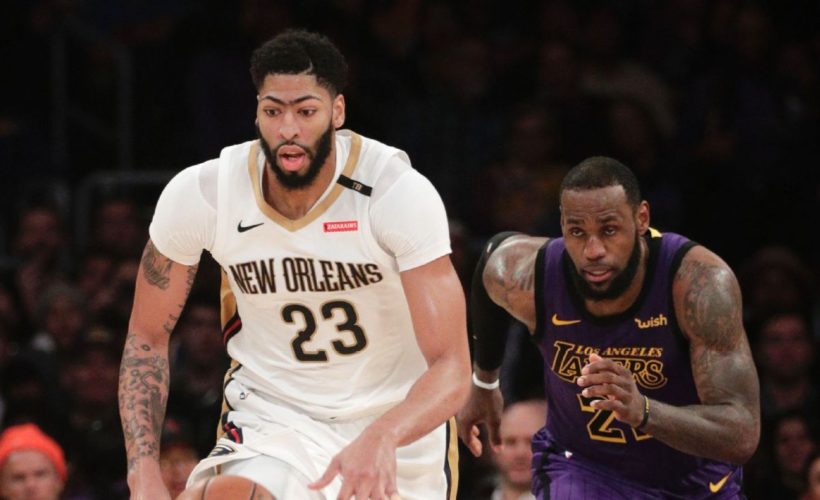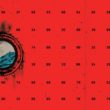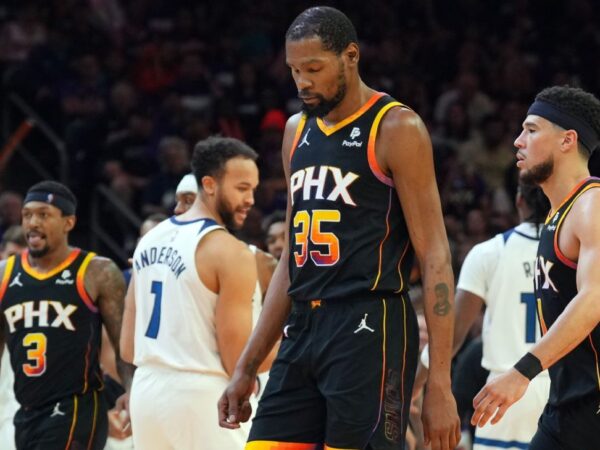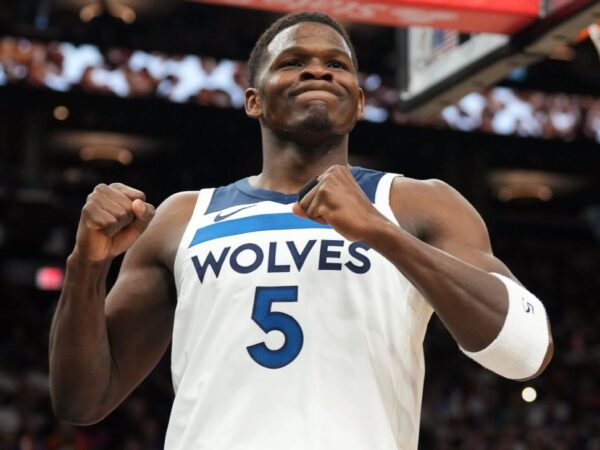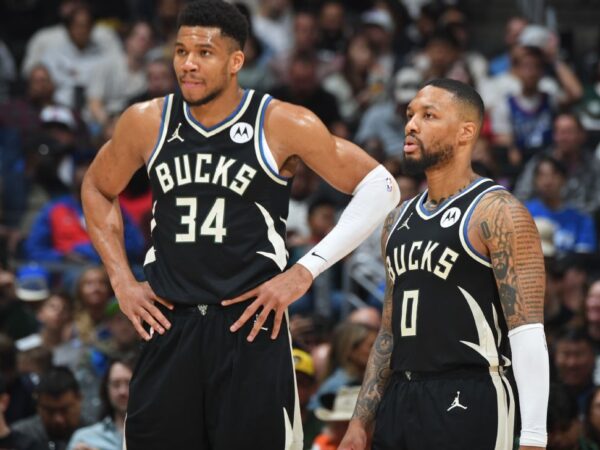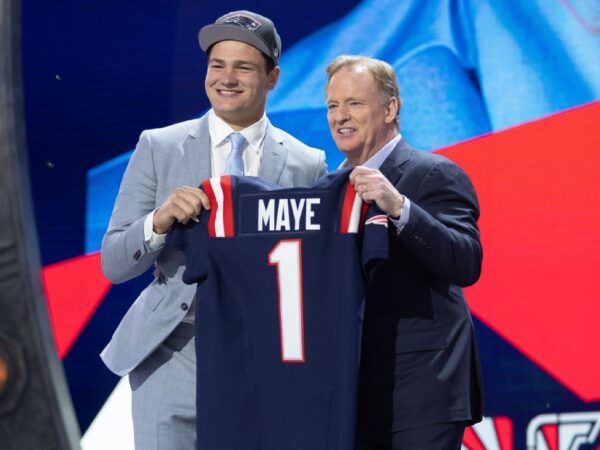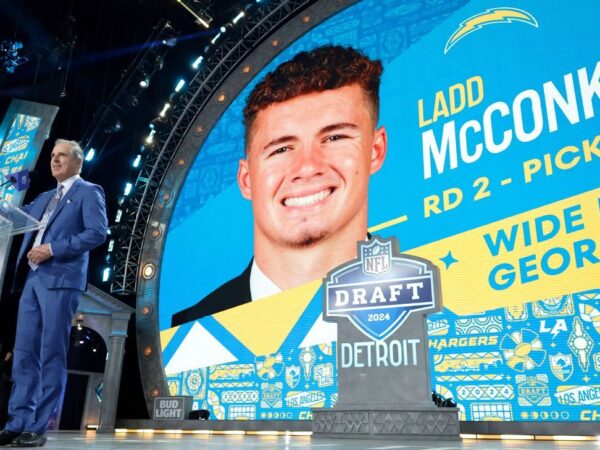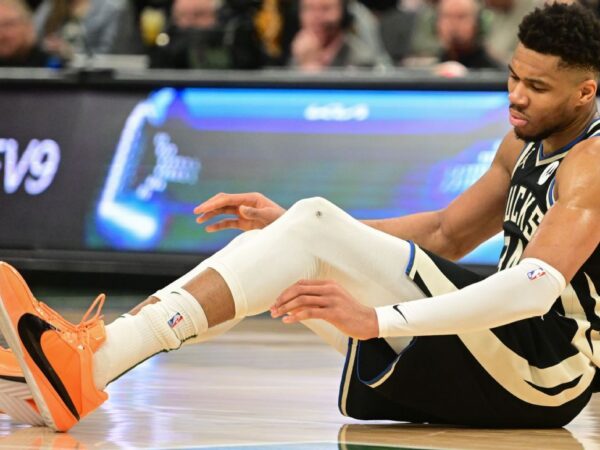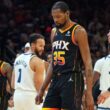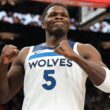As the future of Anthony Davis surpassed the Warriors’ spat and Whatever The Hell Is Happening With Markelle Fultz as the biggest story in the league, two streams of pushback trickled from concerned NBA citizens:
• The media is chasing clicks.
• LeBron is tampering by saying — in response to a question from ESPN’s Dave McMenamin — that it would be “amazing” to play with Davis, and LeBron as Tampering Laker is another bit of evidence that the league is stacked against small markets.
The media did not make this a story. The calendar did. As everyone knows, Davis will be eligible for a five-year, $240 million supermax extension on July 1. Only the Pelicans can offer that. The supermax gives New Orleans a one-year exclusive negotiating window, and a beefed-up dollars advantage.
We are six months away from that. The Pelicans are 15-20. Did anyone really think a middling Pellies season would go by without insiders — media, agents, executives — exploring what Davis might do? The second he declines the supermax — if he does — he effectively becomes a free agent.
Alvin Gentry can proclaim all he wants today that New Orleans isn’t trading Davis. It won’t be his call. The entire equation will be different when this Pelicans season ends.
LeBron’s comments and subsequent leaks — supported hours later by comments from Davis to Yahoo’s Chris Haynes — that money will not drive Davis’ decision could have freaked the Pelicans into accelerating their timetable on potentially trading him. (Those comments weren’t shocking. I have been predicting for months — including most recently in a Dec. 15 television special with Adrian Wojnarowski — that Davis would turn down the supermax if New Orleans offers it. I would still predict that today. Davis’ representatives surely know how close they can get to supermax money by cycling through short-term deals until Davis locks in the largest long-term contract — a strategy interested teams expect Davis to follow, sources say.)
The Celtics are lined up as the Lakers’ prime competition for Davis, but due to a quirk in the collective bargaining agreement, they cannot trade for him as long as Kyrie Irving is also playing under a designated player extension — effectively until July 1.
Before then, the Lakers could in theory negotiate a trade for Davis without any competition from a Boston team stacked with young players and draft picks — including as many as four first-rounders in the 2019 draft. (The Celtics are still on pace to receive protected 2019 picks from Memphis, Sacramento and the Clippers, but LA’s lottery-protected pick has come into some jeopardy.)
A destabilized and panicked Pelicans organization would benefit the Lakers now.
A lot of the outcry about LeBron’s alleged tampering (which, to be clear, was not actual tampering under the league’s interpretation of the rules) was less about tampering or some anti-small-market bias and more about LeBron. Rich Paul, one of LeBron’s best friends, founded and runs Klutch. LeBron does not have an equity stake in Klutch. That would violate the collective bargaining agreement. ESPN’s Brian Windhorst reported last year that the league found LeBron had no such interest.
Commission from Davis’ player contracts would be a drop in the bucket to LeBron anyway. He has a lifetime deal from Nike. He is now officially an entertainment mogul. Even so, a lot of rivals sniff that they don’t know where LeBron ends and Klutch begins.
That noise misses the point. Davis has not yet told those close to him that he is dead set on the Lakers or any other specific team should he decide to leave, according to a source familiar with his thinking. He does not appear ready to demand a trade. All of that could, of course, change at any moment.
Regardless: There is no denying the importance of this story. Any trade over the next year involving Davis might be the single most important trade of an NBA veteran since the Lakers acquired Kareem Abdul-Jabbar from Milwaukee in 1975. (Kevin Pelton once tackled this question from a more analytics-infused perspective.)
That categorization eliminates draft day trades and predraft swaps (Kobe Bryant, Magic Johnson, Kevin McHale/Robert Parish, Dirk Nowitzki); free agency signings (Shaquille O’Neal to the Lakers, LeBron’s return to the Cavs and subsequent move to the Lakers, Kevin Durant to the Warriors); and sign-and-trade transactions (LeBron to the Heat). The Shaq, Durant, and LeBron moves produced eight championships and 14 Finals appearances (and counting). It will be hard for a Davis trade to match them in leaguewide significance.
Still, those aren’t the same as real trades. Let’s look at some post-Kareem trades that might measure up:
• Charles Barkley won the MVP in his first season after Philadelphia traded him to Phoenix, and led the Suns to their second appearance in the NBA Finals. He also turned 30 that season. Davis is 25.
• The Thunder trading James Harden is a flashbulb NBA moment. Harden had just turned 23. He is a perennial MVP candidate. But I’m not sure even the most bullish Harden optimists thought he could be this good.
• None of the Paul George, Dwight Howard, Carmelo Anthony, Pau Gasol, Clyde Drexler, Shaq-to-Miami, Jason Kidd (to the Nets), Deron Williams, Jimmy Butler, or DeMarcus Cousins deals quite fit. Howard might actually come the closest; he was a year removed from finishing runner-up in MVP when the Magic traded him to the Lakers. But the endless, candy-addled Dwightmare stained his reputation, and the injury problems that eventually derailed him started toward the end of his final season in Orlando. Don’t sleep on the Nets adding 28-year-old Kidd, either.
The rest of those guys were/are really good, but I’m not sure any measure up to peak Davis. Entering this season, there was a clear NBA top seven (in no particular order): LeBron, Durant, Davis, Kawhi Leonard, Giannis Antetokounmpo, Harden and Stephen Curry. A few players — Joel Embiid, Nikola Jokic, and George given his early-season bossing — are threatening to crash that group, but Davis stands above George.
• New Orleans (sigh) trading Chris Paul to the Clippers is perhaps the best analogue. Paul was 26, with four All-Star appearances and two top-five MVP finishes in the rearview. There was at least somewhat of a bidding war for him.
We might be heading toward one for Davis, and that is one thing that could distinguish Davis and Leonard even though their situations — heading toward supermax eligibility, with one year left on their deals — are identical.
For whatever reason, there appears to be more urgency about acquiring Davis as soon as possible. No one — at least not right now — seems inclined to wait until he hits free agency in (potentially) July 2020, as both Los Angeles teams did with Leonard. That softened the market for Leonard, and produced a situation in which the team that acquired Leonard (Toronto) did so knowing it started at a disadvantage in re-signing him. A bidding war means more assets going the other way — more leaguewide impact.
Leonard was also coming off a lost season; Davis’ major injury problems appear mostly behind him. Leonard is a little older.
• Kevin Garnett was 31 when the Celtics acquired him from Minnesota. They got one-and-a-half seasons of MVP-level play and a championship before Garnett suffered a leg injury jumping for an alley-oop in Utah in February 2009. (P.S.: Did you see what Garnett said he told Davis recently? Yikes.)
Boston was not considered any sort of big-market glamour destination then, nor before it wooed Al Horford, Gordon Hayward and Irving. The Celtics do match the Lakers in historical cachet, and most important, they are a really good team without Davis. The Pelicans are not.
It is easy to lose control and coherence in the team-building process. The Pelicans almost remind of the Wizards in the way a long-term plan slipped through their grasp, and they ended up piling semi-justifiable reactive move upon semi-justifiable reactive move (along with some unjustifiable ones) until they boxed themselves into a team that might not be good enough.
The “good enough” part is what they want to repair now, six weeks before the trade deadline. They are a little better than their record, with an overall scoring margin of plus-27. Their record in close games is killing them; New Orleans is 3-10 in games within three points during the final three minutes of regulation, the worst record in the league — and a stark reversal from their 23-16 mark in such games last season, per NBA.com.
In true Pelicans fashion, Elfrid Payton, their starting point guard, played five strong games, got hurt, missed nine games, and got hurt less than 10 minutes into his return game. He is due back soon. Nikola Mirotic hasn’t played in two weeks; New Orleans has outscored opponents by a ginormous 11 points per 100 possessions with Jrue Holiday, Davis and Mirotic on the floor.
They hope the team that eviscerated the Portland Trail Blazers in last season’s playoffs still exists. That hope is not unreasonable. They are only four games out of the playoffs.
If Davis leaves, it will be primarily because New Orleans hasn’t won enough. They microwaved the Davis era by trading two lottery picks — No. 6 (Nerlens Noel) and No. 10 the following season (Payton, ironically) for Holiday in the spring following Davis’ rookie season. Those picks of course could have become much better players than Noel and Payton, but Holiday has been everything the Pelicans hoped when healthy. No one was whining when Holiday laid waste to the Blazers last spring.
They rushed to surround the Holiday-Davis core with what Dell Demps, the team’s GM, dubbed “young veterans” — including the “finishing five” of Davis, Holiday, Eric Gordon (jewel of the Paul trade), Ryan Anderson and Tyreke Evans. Anderson came almost for free, Evans in exchange for Greivis Vasquez, Robin Lopez and swap rights on one second-round pick.
But those players were veterans, which meant the Pelicans were both low on first-round picks and about to be expensive. It seemed unlikely that core had championship-level upside. Their one holdover lottery pick — Austin Rivers — did not work out.
Dealing Lopez kicked off a years-long search for a center who cost them another pick (in exchange for Omer Asik) and cap space they lit on fire for Asik and Alexis Ajinca. Davis’ preference against playing center makes for an interesting parallel with LeBron’s distaste for sliding to power forward in his first stint in Cleveland. Their teams could not convince them, and the resulting stalemates infected roster decisions.
When the Pelicans got cap space again, it was at the worst time: the summer of 2016, when the cap spike led to gross overpays. Their deal for E’Twaun Moore worked out fine (recent mega-slump aside). The bigger one for Solomon Hill did not. (They considered spending all of their space on Harrison Barnes, sources have told ESPN.com, a move that probably wouldn’t have changed their trajectory.)
Anderson and Gordon left in that same offseason; the Pelicans got nothing but the resulting cap space in exchange. A year earlier, Al-Farouq Aminu walked for nothing.
They pivoted again for DeMarcus Cousins, a move that cost them Buddy Hield and yet another pick. The deal was lauded at the time. Cousins tearing his Achilles will go down as an ultimate what-if turning point. Even before the injury, the Pelicans were in trade talks for Mirotic, sources have told ESPN.com. On its own, the Mirotic deal was fine. But if Cousins had stayed healthy, it would have meant that three of New Orleans’ four best players — Mirotic, Cousins, Davis — could not have been on the floor together, the sort of jumble that materializes when a team flings itself from plan to plan.
They stepped into that same jumble by using their midlevel exception on Julius Randle last summer. In their semi-defense, it was almost impossible to find a needle-moving wing in that salary range.
Taken together, the Pelicans didn’t maximize enough of their assets. Toss in some bad luck and bad signings, and you arrive at this imperfect place. There is an alternate reality where they realize they have Davis under team control for six or seven more seasons, and build patiently around him. Perhaps ownership under Tom Benson did not allow for such patience. There is another where they stop dealing after the Holiday trade. Neither is guaranteed to have produced a better team today, but the overall continuum of outcomes for each scenario would probably reveal slightly higher chances of 55-win-level contention.
Market size and location matter. Suggesting they are irrelevant in the age of globalization is a little naive. But they represent only one variable, and perhaps not the most important.
The Celtics turned themselves into a destination by maximizing their assets to an almost absurd degree. The Thunder — the teensy-market Thunder — coaxed George into staying by maintaining a certain level of winning and organizational structure. (The Thunder in theory could offer George for Davis, but George is waaaay too good to risk without any assurance Davis would stay.)
The Spurs and Heat have the pedigree that interests a certain type of star. (It’s unclear if Davis is such a star.) San Antonio is light on assets. The Heat could put together a compelling package if they include two and maybe all three of Josh Richardson, Bam Adebayo and Justise Winslow, along with every pick they can offer.
Such a deal removes almost everyone Davis would want as teammates. Ditto for the best deals the Bulls (in Davis’s hometown, remember) and Knicks could build, though things get interesting if either team lands the No. 1 pick.
Philadelphia has the goods, but Klutch’s representation of Ben Simmons complicates that discussion. The Warriors have been publicly linked to Davis before — and would surely be interested, sources say — but it’s hard to find a realistic path ahead of next season. They aren’t trading Curry or Durant for him; Durant is a free agent anyway. Draymond Green probably isn’t enticing enough as a centerpiece considering what little else the Warriors have in draft picks and young players. Klay Thompson is a free agent too, and it seems unlikely he would agree to a sign-and-trade sending him to New Orleans.
That might leave only Boston and the Lakers with the combination of assets, remaining roster power, and market/historical appeal. The Celtics want their chance, and if they get it, expect them to be ultra-aggressive even without any assurances from Davis that he will re-sign. The Celtics are confident in the team and culture they have built under Brad Stevens.
Other teams will try to butt their way in if the Davis sweepstakes materializes. New Orleans will fight like hell to make sure it never does. Davis is worth all of it.
Source:ESPN

